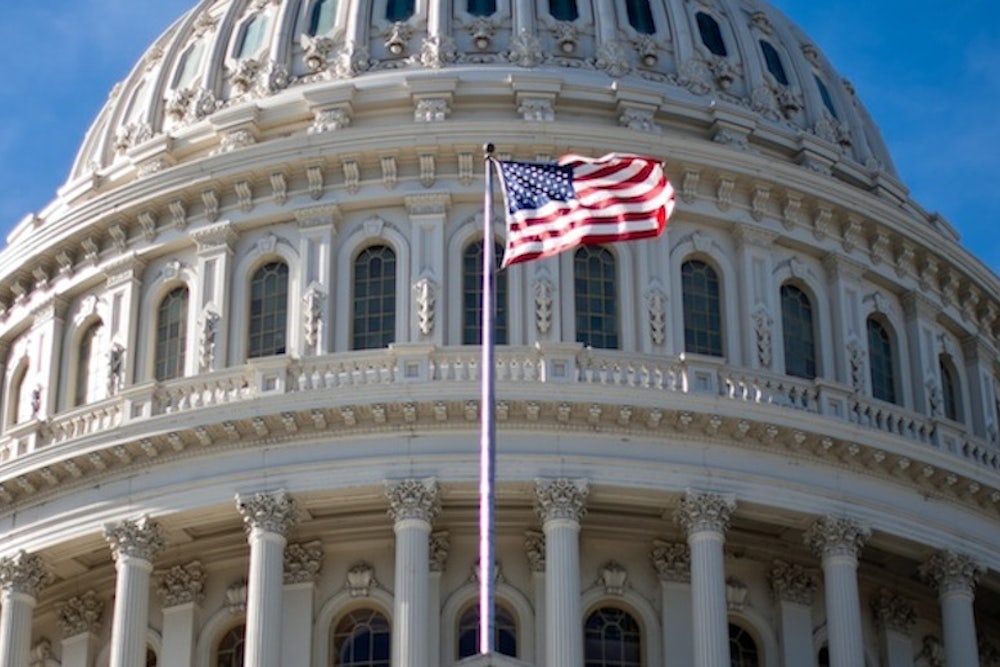On Monday, Will Portman wrote a piece for the Yale Daily News on coming out as gay and how his decision inspired his father Rob Portman, the Republican senator from Ohio, to endorse same-sex marriage. A lovely essay, it nonetheless made for strange circumstances. Politicians who “put family first” are usually preempting scandal; their children, when they’re in the news, are usually mired in it. So it was refreshing to see the Portmans exemplify a different kind of politician-offspring relationship, one that is becoming increasingly common: Parents who credit their children with changing their minds on gay marriage.
Senator Portman’s “change of heart” is the most stirring example, but it’s far from the only one. Last week, Hillary Clinton, in a video released by the Human Rights Campaign, listed among many reasons for her newfound support her fond memory of Chelsea’s recent wedding. “Our own daughter married the love of her life, and I wish every parent that same joy,” she said. On Sunday, Senator Claire McCaskill revealed her support for gay marriage in a post on Tumblr, writing, “My children have a hard time understanding why this is even controversial. I think history will agree with my children.” Dick Cheney and his wife Lynne indicated that their daughter Mary, who is gay, is the reason they support gay marriage. (Will Portman’s essay was the rare glimpse into how, exactly, a child can make this happen. “Through the process of coming out,” he wrote, “we’d had a tacit understanding that he was my dad first and my senator a distant second. Eventually, though, we began talking about the policy issues surrounding marriage for same-sex couples.”)
Other political children have been out ahead of their parents, using their famous last names to bring attention to the issue even when their parents still opposed it. The three eldest Huntsman sisters—Mary Anne, Liddy, and Abby—all publicly supported same-sex marriage before their father, Jon Huntsman. But they seized on the fact that he endorsed civil unions for gay couples in 2009, Abby told me, and pushed him to go further. “We had conversations about it with my dad all the time,” she said. “He was more than ready to go there.” When he finally wrote an op-ed for the American Conservative in mid-February saying that he supported gay marriage, Abby helped him write it. Barbara Pierce Bush, one of George W. Bush’s twin daughters, filmed a short spot in favor of a 2011 marriage equality bill in New York State. Her mother, faced with the opportunity to do the same, chickened out, asking that supportive statements she’d made about same-sex marriage be pulled from a pro-marriage-equality ad. (Meanwhile, George W. Bush has given no signals that he’s moving on the issue.) And while being a Republican and marriage equality advocate can be a real bitch—her words—Meghan McCain has pushed the issue tirelessly as a writer and speaker. She apparently won over her mother, who appeared in a pro-same sex marriage photo shoot in 2010; John McCain, however, remains opposed.
A Pew poll released last week found that 70 percent of voters born in 1981 or later—this includes McCain, McCaskill’s children, Bush, and the three eldest Huntsman daughters—are in favor of legalizing same-sex marriage. The same poll showed that knowing a gay person is the number one reason that people have changed their minds on the issue. So it shouldn’t be a total surprise to see politicians citing their children, whether gay or straight, when they explain their new position. Still, all this gives off the heartening impression that pols’ recent embrace of same-sex marriage is less calculated than sincere. Sometimes, the influence of the kitchen table wins out over the smoky back room. President Obama said as much in his May interview with ABC’s Robin Roberts, when he admitted that his daughters grasped the stakes of marriage equality long before he did. “There have been times where Michelle and I have been sitting around the dinner table and we’re talking about their friends and their parents and Malia and Sasha, it wouldn’t dawn on them that somehow their friends’ parents would be treated differently,” he said. “It doesn’t make sense to them, and frankly that’s the kind of thing that prompts a change in perspective.”
Of course, the most important opinions in the marriage equality debate right now aren’t in the Senate or the White House. They are in the Supreme Court. And at least one person is hoping that those familial persuasions extend beyond the nuclear family. Chief Justice John Roberts’s openly gay cousin, Jean Podrasky of San Francisco, will be in the Supreme Court gallery as government lawyers push the court to strike down a ban on same-sex marriage in her state. “He is a good man,” Podrasky told the Los Angeles Times. “I believe he sees where the tide is going. I do trust him. I absolutely trust that he will go in a good direction.” Here’s hoping he spots her in the courtroom.
